Woman Uncomfortable With Boyfriend Adopting His Ex's Dogs Because She Grew Up In a Family With Nine Dogs
In a twist of fate, a seemingly harmonious relationship has been shaken by an unexpected turn of events. A couple who had been together for six months, previously considering a shared future of living together and marriage, now finds themselves at a crossroads due to a decision involving two Chihuahuas.
The couple had been steadily progressing in their relationship, with the boyfriend integrating his partner into his family life and extending invitations to significant gatherings. However, their stability was challenged when the boyfriend was approached to adopt his ex's two Chihuahuas, aged three, following her relocation to Russia. The request came from a third party, which sparked questions about the nature of his past relationship.
Upon sharing the news with his partner, doubts began to creep in. Insecurity and concern emerged about the boyfriend's commitment to the current relationship, given the history of his former connection. The partner, though hesitant about the adoption due to concerns about compatibility, felt sidelined by the unilateral decision.
The partner's sentiments highlight a deeper issue of communication and trust within the relationship. While the boyfriend maintains that his actions are rooted in genuine care for the animals and not a lingering affection for his ex, the partner struggles to shake off the feeling of being deprioritized.
As they navigate this unexpected challenge, the couple's shared affection for their four-legged companions and hopes for a future together hang in the balance. It raises questions about the compromises necessary in relationships and the complexities that external factors can introduce.
OP and her boyfriend have been together for six months, and now his ex has asked him to adopt her Chihuahuas.
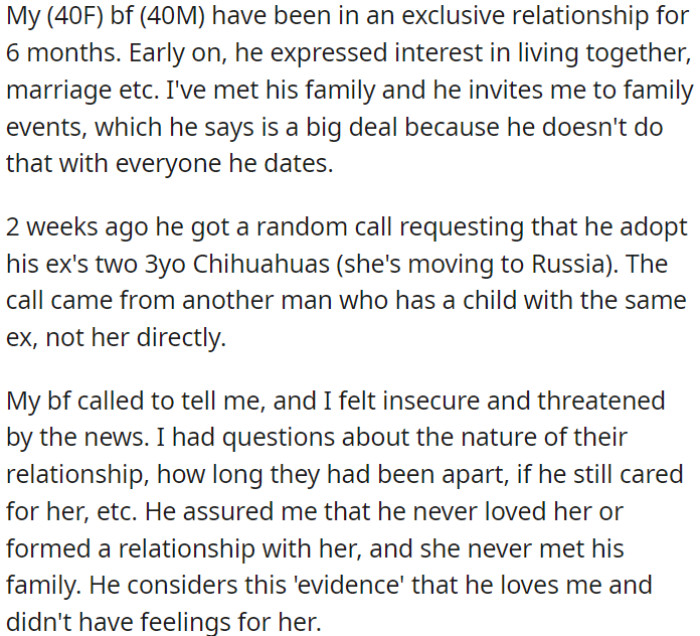
OP expressed disapproval but agreed to support him.
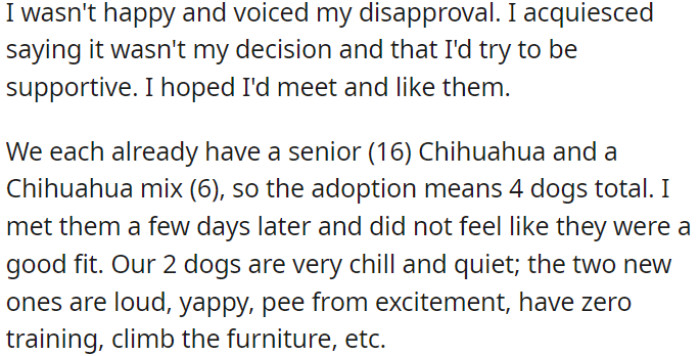
The abrupt decision was made without involving OP or allowing a meeting between her dog and the new ones.
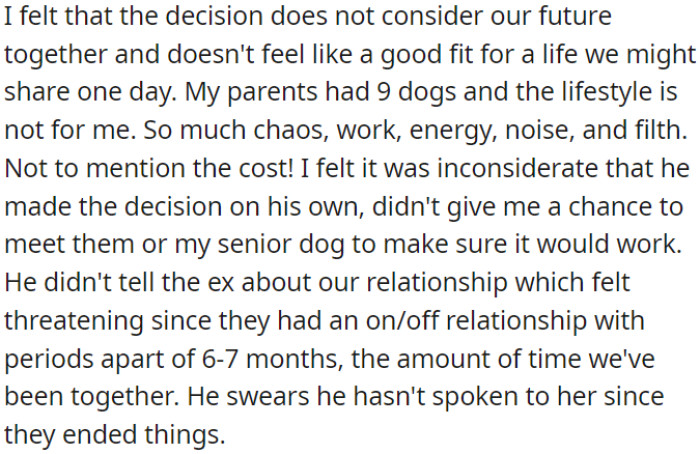
Attachment Styles in Relationships
Understanding attachment styles can provide insight into relationship dynamics, especially in situations involving significant changes, like adopting pets. Research by Dr. Phillip Shaver and Dr. Mario Mikulincer suggests that individuals with anxious attachment styles may feel threatened by such shifts, interpreting them as potential competition for affection.
This can lead to increased anxiety and discomfort. Recognizing these patterns can help partners communicate more effectively about their feelings and needs, ultimately strengthening their bond.
Behavioral psychologists highlight the importance of understanding one's emotional triggers in relationship dynamics. For instance, feelings of discomfort around adopting pets may reflect deeper issues related to past experiences or unresolved emotions.
According to research from the University of Michigan, engaging in self-reflection and journaling can help individuals identify these triggers, leading to improved emotional regulation. This self-awareness can empower partners to address their concerns constructively, paving the way for healthier interactions and shared decision-making.
Understanding Emotional Attachments to Pets
Dr. Anna Brooks, a licensed psychologist at the University of Toronto, explains that emotional attachments to pets often reflect deeper relational dynamics.
In this case, the woman's discomfort with her boyfriend adopting his ex's dogs highlights issues of trust and emotional security.
Such feelings may arise from fears of being compared to past relationships, triggering insecurities.
OP sensed that her boyfriend prioritized his ex's feelings and needs over her own and even her dog's.
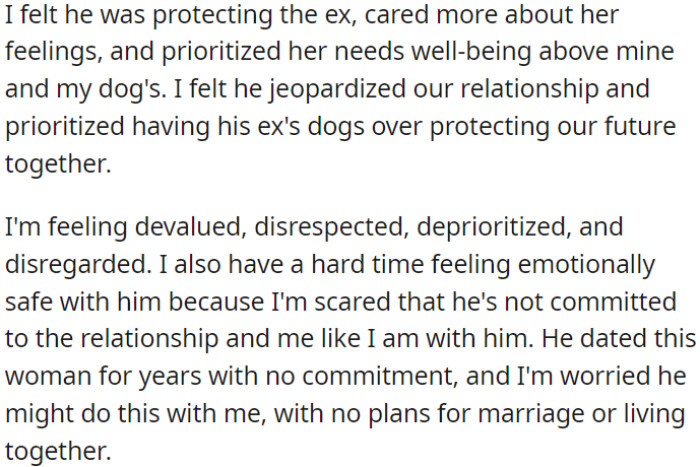
OP's feelings are unresolved; she is unsure about their future due to the dogs.
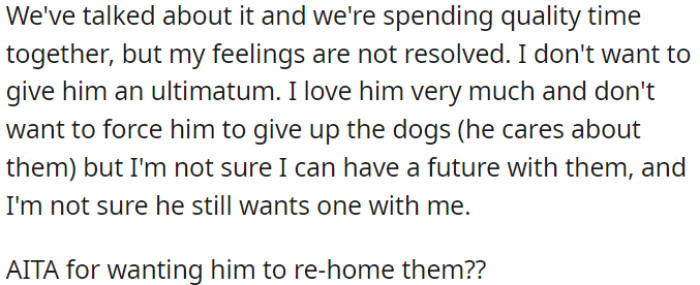
OP's points are valid: bringing along the dogs would result in doubled costs and energy expenditure.
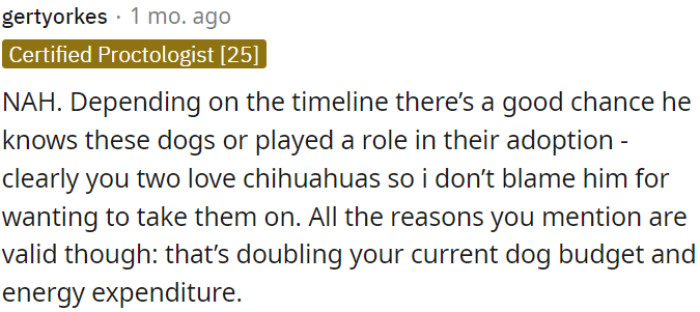
According to studies published in the *Journal of Family Psychology*, pets can significantly impact human relationships. The presence of pets often enhances emotional intimacy and provides support during challenging times.
However, adopting pets from previous relationships can stir feelings of jealousy or insecurity, particularly if one partner feels overshadowed. Experts recommend addressing these feelings openly, fostering a space for dialogue where both partners can express their concerns and expectations regarding the shared responsibility of pet care.
Research shows that pets can embody significant emotional connections for individuals, making transitions particularly sensitive.
According to studies published in the Journal of Applied Animal Welfare Science, the emotional weight of past relationships can complicate new partnerships.
Understanding these dynamics can help individuals approach the situation with empathy.
It seems OP is feeling quite insecure and more invested in this relationship than he is.

If OP is still feeling insecure about their relationship, she might not be ready for long-term decisions like this.
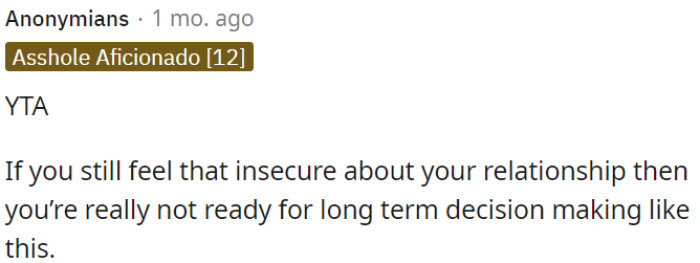
It's reasonable for her to express her concerns once, then allow him to make his decision.

Conflict Resolution Strategies
Conflict in relationships often arises from unmet expectations and miscommunication. Research published by the American Psychological Association indicates that employing effective conflict resolution strategies can lead to healthier relationships.
Techniques such as active listening, “I” statements, and collaborative problem-solving can help partners navigate difficult conversations. By focusing on shared goals rather than individual grievances, couples can foster understanding and build a stronger emotional connection, ultimately reducing discomfort regarding external factors like pet adoption.
Navigating Relationship Insecurities
Insecurities in relationships often arise from comparisons and fears of inadequacy.
Dr. Lisa Tran from Harvard Medical School emphasizes that addressing these feelings openly can foster stronger emotional bonds.
Encouraging honest discussions about fears and insecurities can create a more supportive relationship environment.
If his choice isn't right for OP, she should move on.

While deciding to adopt pets can reveal what kind of person someone is and how caring they are, suddenly bringing in two Chihuahuas from an ex-partner raises real worries about honesty and open communication.
The partner's concerns about the dogs aren't just about them being noisy, messy, or costly. It's more about feeling pushed aside and less important compared to memories of the ex.
The boyfriend might mean well and genuinely care for the dogs. However, not discussing such a significant choice with his partner makes her feel uncertain and undervalued. Good relationships require considering how the other person feels, even when external problems arise.
To navigate situations involving emotional attachments to pets, it may be helpful to establish boundaries around pet ownership and emotional expectations.
Research suggests that setting clear agreements can help mitigate misunderstandings and strengthen relationships.
By discussing feelings openly, couples can work towards mutual understanding and respect.
Psychological Analysis
This situation illustrates the complexities of emotional attachments in relationships, particularly regarding pets.
From a psychological standpoint, fostering open communication can significantly enhance understanding and mitigate conflicts related to insecurities.
Analysis generated by AI
Analysis & Alternative Approaches
In summary, understanding the emotional dimensions of pet ownership can enhance relationship dynamics.
By fostering open dialogue and empathy, couples can navigate conflicts related to pets more effectively.
Ultimately, recognizing and addressing insecurities can lead to stronger, more resilient relationships.
Psychological Analysis
This situation highlights how emotional attachments to pets can tie into deeper relationship dynamics, such as trust and communication. The girlfriend's discomfort likely stems from feeling sidelined by her boyfriend's unilateral decision, stirring up insecurities about the importance of her role in his life. It's a reminder of how crucial open dialogue and mutual decision-making are in maintaining a strong, balanced relationship.
Analysis generated by AI
Moving Forward: Actionable Steps
The interplay of emotions in relationships, particularly when introducing new elements like pets, can be complex. Understanding attachment styles and employing effective communication strategies are vital. Research indicates that couples who navigate these challenges with empathy and openness tend to strengthen their bond, despite external pressures.
By prioritizing dialogue and understanding each partner's emotional landscape, couples can foster resilience and adaptability in their relationship, ultimately leading to a more harmonious coexistence.



